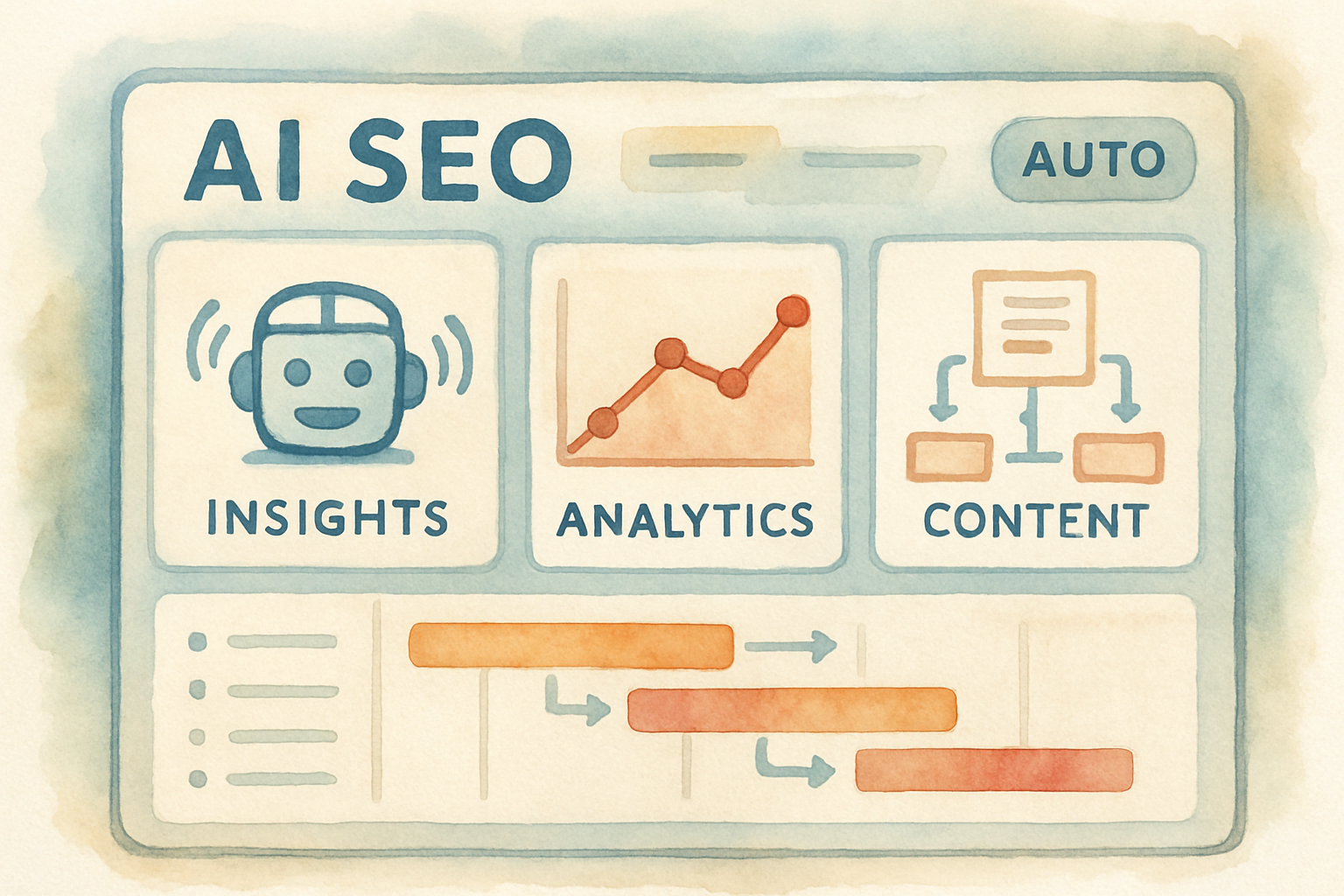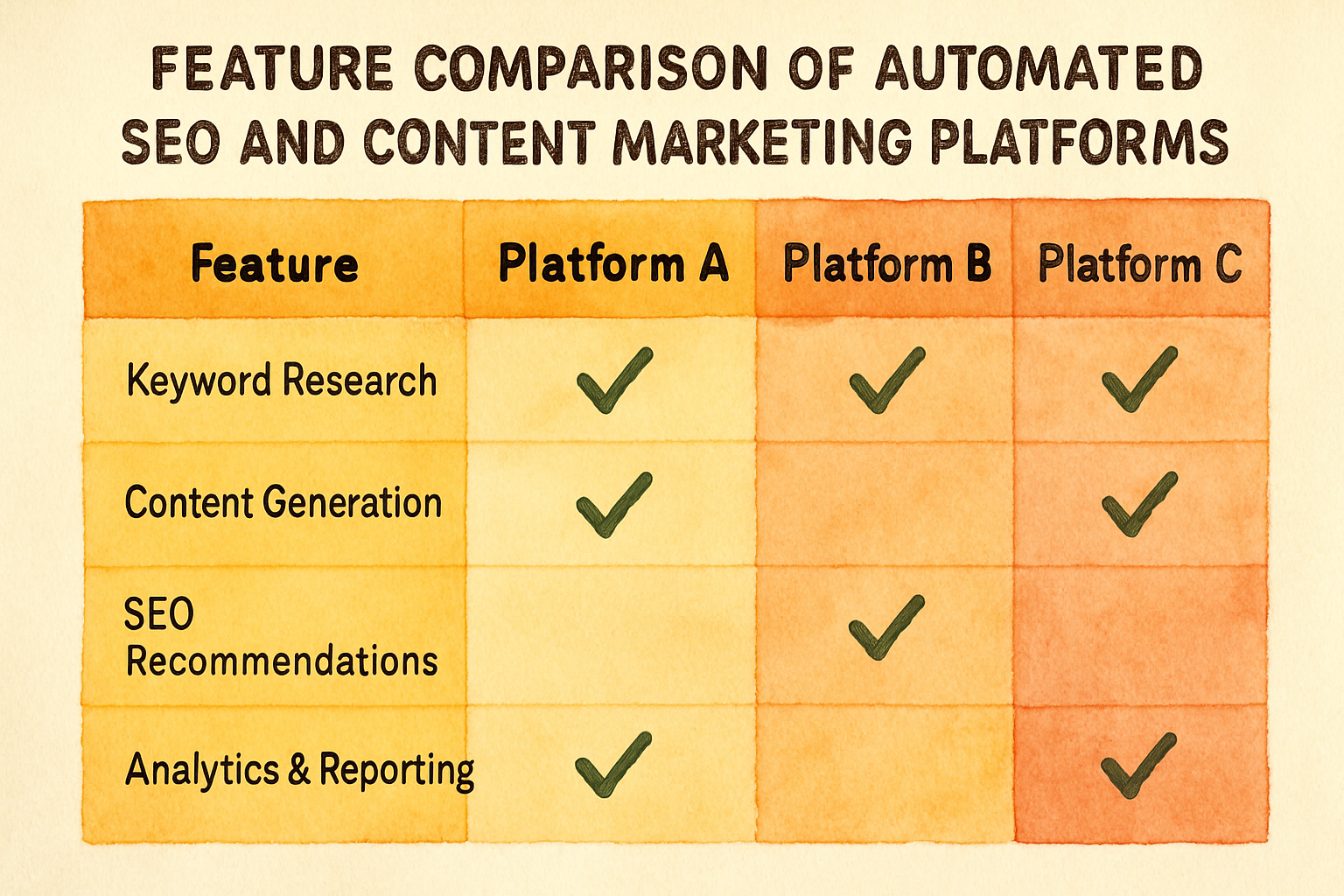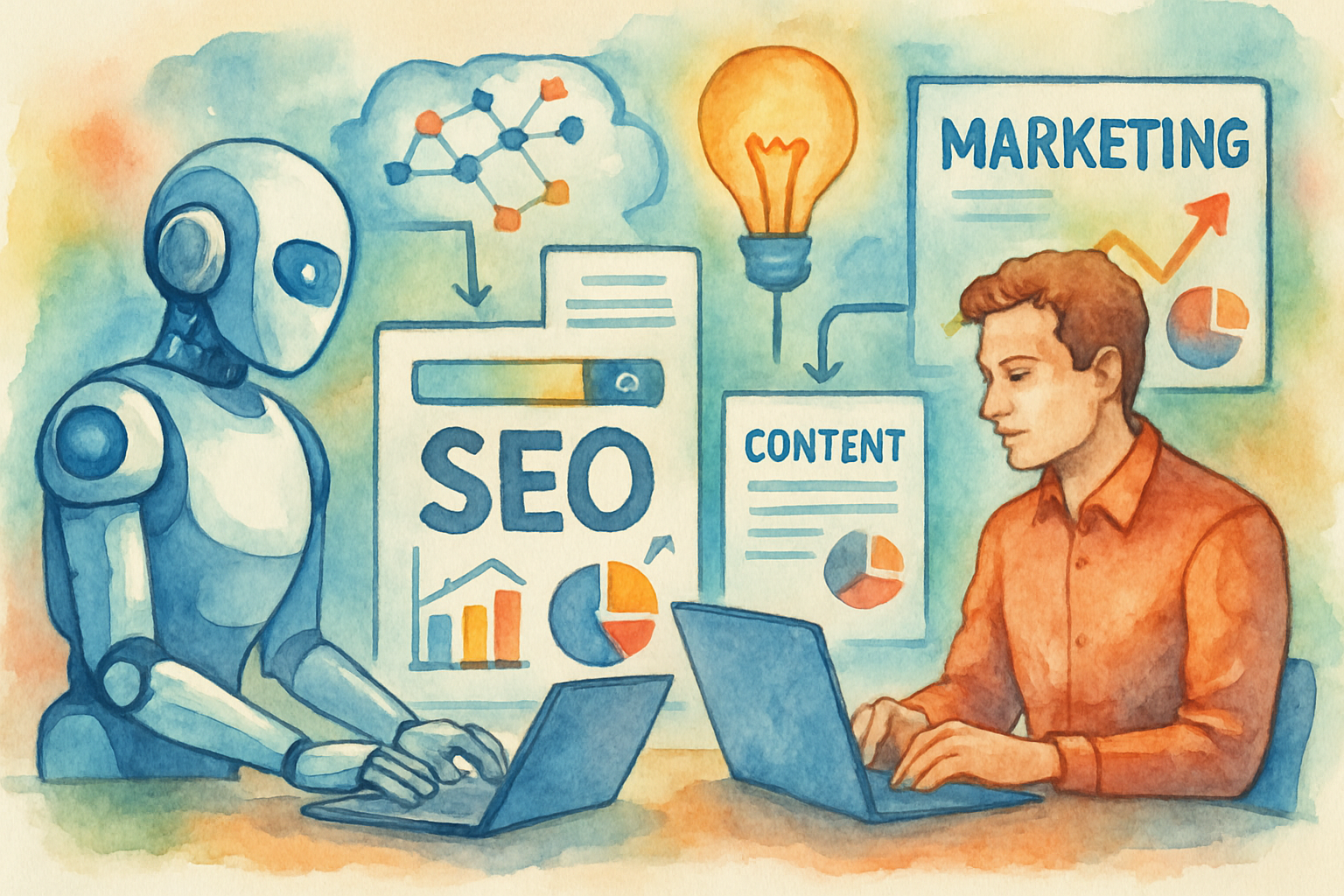Automated SEO and content marketing platforms have revolutionized the way businesses build online presence.
But what are they, exactly?
This guide will walk you through the best tools, benefits, and real-world uses of these powerful platforms.
Some are AI-powered, handling everything from keyword research to content creation.
Some are no-code solutions that anyone can deploy, no technical team required.
Some integrate seamlessly with your existing marketing stack, unifying data and workflows.
Some blend SEO automation with personalized content marketing for maximum results.
Let's dive right in.
What Is an Automated SEO and Content Marketing Platform?
At its core, an automated SEO and content marketing platform uses artificial intelligence and machine learning to simplify and expedite tasks that are traditionally manual, repetitive, and time-consuming. These include keyword research, content ideation, content creation, on-page optimization, performance tracking, and reporting.
Imagine having a smart assistant that combs through your competitors, analyzes your website, finds gaps, and suggests changes—all in real time. That's the promise of these platforms. They go beyond just automating writing; they streamline the entire SEO and content marketing workflow, enabling your team to focus on strategy and creative work.
The best platforms today not only generate content but also optimize it for visibility in search engines and AI-powered discovery, such as large language models like ChatGPT. This means your content is built to be found by both traditional search engines and emerging AI-driven search interfaces.
This approach reflects the changing digital landscape where user intent, content relevance, and quality matter more than ever. With the flood of AI-generated content, standing out requires a user-obsessed mindset combined with intelligent automation.

Why You Need an Automated Platform for SEO and Content Marketing
If you’re wondering whether automation really makes a difference, consider this: many marketers report their content production time dropping from 8 hours to under 3 hours per article by integrating these platforms. This efficiency boost doesn’t sacrifice quality but rather amplifies human creativity with AI assistance.
Here are some key reasons to embrace automation in your SEO and content strategy:
- Speed and Scale: Automate tedious tasks like keyword clustering, competitor analysis, and performance tracking. Produce more content faster without lowering your standards.
- Consistency: Maintain brand voice and style across all content with AI-generated guidelines and editing tools. Your messaging stays cohesive whether you’re a solo marketer or a large team.
- Data-Driven Insights: Use AI to analyze search trends, user intent, and content gaps. This reduces guesswork and helps you target high-impact keywords and topics.
- Cost Efficiency: Save on outsourcing and manual labor. Automation tools can be more affordable than hiring additional staff for research and production.
For example, Gumloop is an AI automation tool that overlays your workflows with AI capabilities, enabling non-technical users to build powerful SEO automations without code. Shopify and Instacart teams use it to automate marketing and sales operations efficiently (source).
How Does Automation Improve SEO & Content Marketing Results?
Automation platforms leverage machine learning to analyze massive datasets—keywords, competitor behavior, backlinks, on-page elements—and then use that intelligence to guide content creation and optimization. This hyper-personalized approach makes your content more relevant to your audience and more visible to search engines and AI search tools.
Surfer SEO, for example, integrates AI-powered optimization features with content writing. It provides keyword density, readability, length, and image suggestions as you write, helping you maintain an optimal SEO score in real time (source).
Beyond optimization, platforms like Conductor offer an enterprise-grade experience with 24/7 site monitoring, competitive intelligence, and AI-driven topic research—ensuring your content adapts swiftly to algorithm changes and emerging search trends (source).
By automating data gathering and analysis, you gain faster insight into what content works, what keywords convert best, and where opportunities lie. This allows for agile marketing decision-making and better resource allocation.
Which Tasks Can Be Automated in Your SEO & Content Workflow?
Automated platforms can power a wide range of functionalities that once required specialized human effort. Here are critical tasks you can automate today:
Keyword Research and Competitive Analysis
Tools like LowFruits automate SERP and competitor analysis at scale, uncovering long-tail and hidden gem keywords. They also cluster keywords into relevant topics and identify gaps your competitors miss (source).
Content Ideation and Topic Generation
AI-powered platforms use live data and your brand knowledge to suggest fresh, relevant topics for your niche. AirOps helps content marketing teams create editorial topics aligned with SEO priorities, boosting production efficiency (source).
Content Creation and Optimization
AI writing assistants like Jasper and Surfer AI help draft content faster while optimizing for search intent and keyword relevance. Platforms integrate with CMSs and editors for a streamlined workflow.
On-Page SEO and Website Optimizations
Solutions like Alli AI embed on your website CMS to automatically generate SEO recommendations, handle schema markup, and even apply approved optimization changes instantly.
Performance Monitoring and Reporting
Real-time dashboards with AI analysis—like those provided by SEO Stack or Conductor—allow marketers to track site health, keyword rankings, and traffic. They send alerts for issues before they impact SEO.
Workflow Automation
Platforms such as Gumloop and Zapier create automated workflows connecting tools and APIs that handle data moving, content proofreading, publishing triggers, and more—all without coding expertise.
Wondering which task to automate first? Start with keyword research or content optimization—these yield the fastest ROI.
How to Choose the Right Automated SEO and Content Marketing Platform
With so many options on the market, selecting the best platform for your business requires a thoughtful approach. Here are critical criteria to evaluate:
- Integration Capability: Does the platform easily connect with your CMS, CRM, analytics tools, and marketing stack? A unified ecosystem improves efficiency.
- No-Code or Low-Code Usability: Can non-technical marketers build workflows and automations without engineering help?
- AI Sophistication: Does the tool leverage advanced large language models (LLMs) like GPT-4 for content intelligence?
- Customization Flexibility: Can you tailor content tone, keyword focus, and automation workflows to your brand and strategy?
- Real-Time Reporting and Alerts: Are you notified proactively about SEO issues and opportunities that need immediate action?
- Scalability and Support: Is it suitable for your company size now and as you grow? What training and customer support are available?
- Pricing Transparency: Does the tool provide free trials, transparent pricing, and flexible plans that fit your budget?
Popular platforms like Gumloop, Surfer AI, and Alli AI all excel in various aspects and have pricing plans that accommodate freelancers to large enterprises (source).

Real-World Success Stories from Automated SEO Platforms
Automation isn’t just theory—it delivers measurable results. Take the case of a longtime auto service company that used a layered SEO strategy, including content and technical fixes, to move multiple keywords to top-three Google positions, doubling their organic traffic and tripling conversions within a year.
This was achieved by focusing on local SEO, removing duplicate content, setting up analytics properly, and building content pages aligned with key service terms—all of which could be streamlined further today with automation platforms (source video).
Another example comes from Shopify’s CEO urging employees to embrace AI tools like Gumloop for internal marketing and sales operations, reflecting how automation is shaping industry leaders' digital strategies (source).
How to Integrate Automation into Your Marketing Strategy Effectively
Jumping straight into automation without a plan can cause more headaches than benefits. Here's a step-by-step approach to a smooth rollout:
- Assess Your Current Workflow: Map out repetitive or time-consuming tasks that can be automated.
- Set Clear Goals: Define what success looks like—saving X hours per week, increasing organic traffic by Y%, or improving content output.
- Choose Your Platform: Pick a tool meeting your needs and budget. Take advantage of free trials to test compatibility and usability.
- Start Small: Begin automating low-risk tasks like keyword research and content optimization.
- Train Your Team: Ensure everyone understands how to use the platform and incorporate automation outputs into their workflows.
- Monitor and Optimize: Track KPIs, audit AI-generated content for quality, and refine your automations regularly.
- Scale Responsibly: Gradually extend automation to other SEO and marketing operations, maintaining a human-in-the-loop system to preserve creativity and quality.
Automation supports your marketing but should never fully replace human expertise. Keep humans as operators who guide AI carefully to generate the best results (source).
Common Mistakes to Avoid When Using Automated SEO and Content Marketing Platforms
As revolutionary as automation tools are, they aren’t magic. To maximize ROI, steer clear of these pitfalls:
- Over-Reliance on AI Content Alone: AI-generated drafts need editing and fact-checking. Publish only after human refinement.
- Ignoring Searcher Intent: Automation can suggest keywords and topics, but understanding your audience’s true needs is human work.
- Lack of Integration: Using siloed tools instead of an integrated platform leads to inefficiency.
- Neglecting Data Privacy and Security: Choose platforms that comply with GDPR and other privacy regulations to protect your datasets.
- Failing to Monitor Performance: Automation isn’t “set and forget.” Use real-time analytics to track the impact of your campaigns.
By avoiding these common errors, you can ensure your automated SEO and content marketing platform boosts your digital presence sustainably.
How Does an Automated Platform Fit into the Future of SEO?
The SEO landscape is evolving rapidly with AI and automation at the forefront. Massive content volumes driven by AI mean traditional SEO tactics alone no longer guarantee competitive edge.
The future belongs to marketers who blend strong SEO fundamentals with intelligent automation—using AI tools as collaborators, not crutches. This hybrid approach helps teams create genuinely useful, user-focused content while leveraging data and AI to reach and convert more effectively.
Google’s ongoing crackdown on low-quality content and emphasis on user experience mirror this trend. Your content needs to be worth finding, not just optimized for algorithms.
In addition, as search expands beyond Google to platforms like YouTube, Pinterest, and emerging AI searches, skills gained from automated SEO tools become highly transferable and future-proof (source).

How Can You Get Started with Automated SEO and Content Marketing Platforms Today?
Ready to take the plunge? Follow these practical steps to optimize your marketing workflows with automation:
- Explore Tools: Start with platforms like Gumloop for building no-code AI agents or Surfer AI for content optimization. Use free trials to test ease of use.
- Define KPIs: Set measurable goals relating to production speed, organic growth, or conversion improvements.
- Pilot a Project: Automate a single workflow such as content proofreading or keyword data collection and analyze results.
- Train Your Team: Teach your content creators and SEO specialists how automation tools integrate with their work.
- Iterate and Expand: Use insights from your pilot to scale automation across your marketing operations carefully.
For more advanced workflows or if you want industry-tested guidance on automation, explore this practical SEO automation guide to deepen your knowledge.
Frequently Asked Questions About Automated SEO and Content Marketing Platforms
Is automation going to replace human SEO and content marketers?
No. Automation tools are designed to assist marketers, not replace them. Human expertise is essential to guide AI, understand audience nuances, and ensure quality and creativity.
Can I automate all types of SEO tasks?
Many repetitive tasks like keyword research, on-page audits, and basic content generation can be automated. Strategy formulation, complex technical SEO, and high-level content creation still require human insight.
Are automated platforms suitable for small businesses?
Absolutely. Many platforms offer tiered pricing and free plans. Automation can significantly reduce labor hours and help small teams compete with larger companies.
How do I ensure AI content is SEO-friendly and user-focused?
Combine AI drafts with human edits, optimize for readability and relevance, and monitor real user engagement metrics to continually improve your content.
What about data privacy and security?
Choose platforms that comply with GDPR and industry standards. Always review privacy policies, especially if handling sensitive customer information.
What's Your Next Step?
Tell us in the comments: How will you apply automated SEO and content marketing platforms to boost your digital strategy? For personalized advice, contact us!
